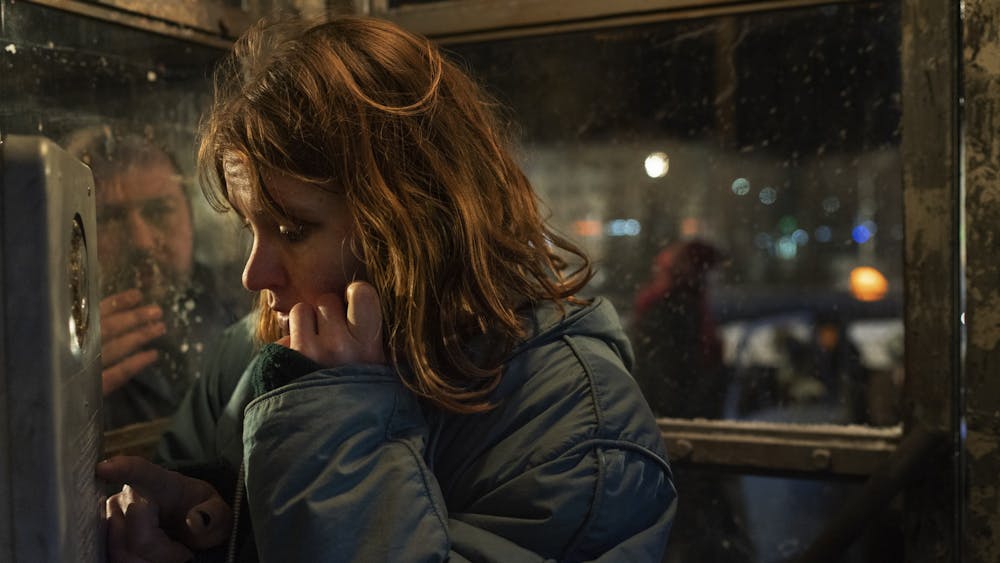From: Silver Screen
REVIEW: ‘Compartment No. 6’ plays with chance and human connection to charming effect

At first glance, “Compartment No. 6” may feel strangely similar to another critically acclaimed international feature, both derived from literature and set in confined spaces. But director Juho Kuosmanen’s adaptation of Rosa Liksom’s novel stands out by being a testament to how love can thrive through proximity and desperate human connection.
The film opens on Laura (Seidi Haarla), a young Finnish archeology student, as she navigates through a house party in post-soviet Moscow hosted by her Russian lover, Irina (Dinara Drukarova). When Irina quizzes her guests in a game of “name that obscure writer who wrote this one line,” Laura’s empty look as she gets it wrong speaks volumes. She constantly feels insecure about herself: as a lover, as a Finnish national in Russia and even about how she acts in social settings.
After Irina cancels at the last minute, she boards a train to see ancient petroglyphs in rural Murmansk alone. There, she encounters Ljoha (Yuriy Borisov) in her train compartment, a loud, straightforward and immature Russian miner heading up to Murmansk for work. As Laura slowly moves away from Irina, she finds herself oddly connected to her compartment companion, whose initial brashness slowly fades once the two learn more about each other.
Calling the train just a narrative device is an understatement: the train propels Kuosmanen’s piece into a sensory experience of both loneliness and introspection. As Laura leaves her compartment to avoid Ljoha’s ramblings, a soundscape of rhythmic rails and creaking train cars feels unsettling and all-encompassing.
Additionally, the film feels economical and minimal in its form; handheld camerawork takes us on claustrophobic — almost suffocating — journeys through the various cars of the train. A gloriously rich grain coats each frame, wonderfully tinted with hues of scarlet and emerald. It’s also not overloaded with expository dialogue, and many times we sit in silence with Laura as she grapples with who she wants to be. When she plays memories of Irina on her camcorder, it doesn’t feel longingly romantic — but rather aching.
But as we travel up toward the Arctic circle, it sometimes feels as if we’re going nowhere. The journey on the train trades dynamism for meditation, and a little too much time and space is spent in cinematic ether. A timid story that lacks typically necessary plot points and dramatic tensions is a hiccup that holds Kuosmanen’s film from being absolutely memorable.
That being said, the film’s set time period — evident by Laura’s retro walkman — still manages to reflect the present. In a dining car, Laura reveals to Ljoha that she wants to visit the petroglyphs because she believes that we must look to the past in order to understand the present. Ljoha disagrees and stresses that we must live in the moment, and escalates the conversation into a petty argument. In times when our understanding of public health feels thinly unpredictable, it’s a thoughtful scene to sit with.
An international co-production between Finland, Estonia, Germany and Russia, “Compartment No. 6” feels delightfully universal. That could be how the film has found success within this year’s awards circuit: it deservedly shared the Grand Prix at Cannes with Asghar Farhadi’s “A Hero” and was shortlisted in the best international feature category for the 94th Academy Awards.
It also isn’t a grand spectacle or chock full of philosophical inquiry, and that’s ok. Its humanist narrative remains grounded in unconscious, careful feelings of empathy. Within their compartment, Laura and Ljoha don’t just slowly open up to one another: they decide who they want to be for themselves. That agency flourishes in the third act — what starts as a story of identity and insecurity slowly blooms into one of warm, human embrace.
Impactful and surprisingly charming without being cliche, “Compartment No. 6” is a great big hug and will force a stupid smile on your face, whether you like it or not. And as our pandemic fears begin to melt away, Kuosmanen’s film arrives at a time when it’s needed most.
“Compartment No. 6” was released in theaters on Feb. 18.




